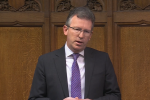I would prefer not to write more about events in Downing Street some months ago, but I fear this week I have no choice. The distraction of politics and government by the ongoing controversy is a profound problem. It undermines government efforts on a wide range of domestic policy challenges and it has international consequences as NATO seeks to present a focussed response to potential Russian aggression towards Ukraine.
The need to resolve this matter swiftly is therefore clear, but given what is at stake we also have to do it properly. The senior civil servant charged with investigating these events internally, Sue Gray, has been asked to limit what she says at this stage to allow an external investigation by the police. I find it frustrating that the police did not begin such an investigation sooner and I am sceptical of the need for a lengthy investigation at this stage. Decisions on liability for fixed penalty notices are generally made swiftly, and although the events in question are not very recent, it seems plenty of evidence is available to consider. It would not be reasonable though to expect Sue Gray to ignore the police request. That means there is more detail to come and I think that detail may be crucial. Sue Gray’s current report tells us that there were failings of leadership at Number 10 and that events happened and developed in ways they should not have done. It is not yet clear which layers of leadership, political or civil service, she is referring to in relation to each event.
The Prime Minister of course has overall responsibility for what happens in Downing Street, but it seems to me that not every transgression by every member of the Downing Street workforce ought to lead to a Prime Ministerial resignation, though they certainly merit a proper apology. It matters then which events the Prime Minister knew about or attended himself, and the character of those events. If the Prime Minister has attended events he knew broke the rules, or was aware of events which he knew broke the rules, he should not have advised the House of Commons, on several occasions, that as far as he was aware, no rules were broken there. Doing so in those circumstances would be misleading the House and must in my view lead to his resignation or removal from office. Sue Gray’s characterisation of these events is important evidence in that assessment and we still do not have it. This is frustrating for me and well beyond frustrating for the many families who suffered for their compliance with the rules. They have a right to expect accountability from the Prime Minister but he has a right to due process, as we all do.
There is little in this episode or the handling of it of which the Prime Minister can be proud, and he may yet need to leave office because of it, but the decision to remove a sitting Prime Minister 2 years after his election with a large majority requires proper consideration of the relevant evidence, as my constituents are entitled to expect me to give it.

